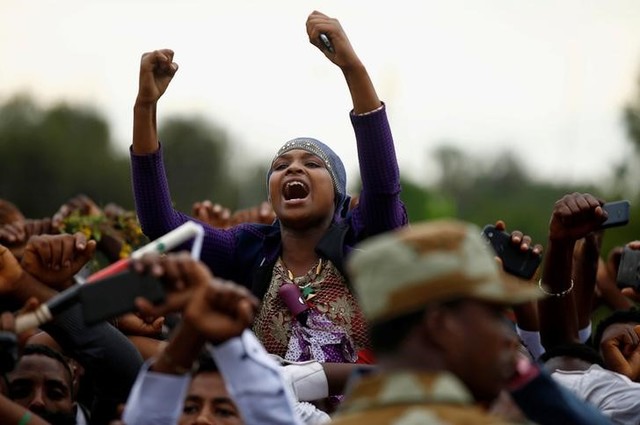Ethiopia blames foreigners for unrest, U.N. experts seek probe

By Reuters
Ethiopia accused “elements” in Eritrea, Egypt and elsewhere on Monday of being behind a wave of violent protests over land grabs and human rights that have prompted the government to declare a state of emergency in the Horn of Africa nation.
The unrest has cast a shadow over Ethiopia, whose state-led industrial drive has created one of Africa’s fastest growing economies but whose government also faces criticism at home and abroad over its authoritarian approach to development.
Ethiopia declared a state of emergency on Sunday after more than a year of unrest in its Oromiya and Amhara regions, near the capital Addis Ababa, where protesters say the government has violated their land and other political rights.
“There are countries which are directly involved in arming, financing and training these elements,” government spokesman Getachew Reda said, referring to the protesters, although he added that those responsible might not have state approval.
Getachew told a news conference the six-month nationwide state of emergency had been declared to better coordinate security forces against “elements” intent on targeting civilians, infrastructure and private investments.
A panel of seven United Nations experts called on Monday for an international investigation into the violence in Ethiopia, which rights groups say has killed about 500 people, a figure the government says is exaggerated.
“The scale of this violence and the shocking number of deaths make it clear that this is a calculated campaign to eliminate opposition movements and silence dissenting voices,” Maina Kiai, a U.N. rights rapporteur, said in a statement.
Last week, protesters damaged around a dozen factories and equipment mostly belonging to foreign firms, accused by the demonstrators of buying property leases on their seized land.
That flare-up followed a stampede on Oct. 2 in which at least 55 people were killed after police fired teargas and shots into the air to disperse protesters during a crowded annual festival in the town of Bishoftu in Oromiya.
Protesters had chanted anti-government slogans and made arm gestures to symbolise repression, while some had waved flags of an outlawed rebel group, the Oromo Liberation Front.
FOREIGN MEDDLING?
Getachew named Eritrea, which has a long-running border dispute with Ethiopia, and Egypt, embroiled in a row with Addis Ababa over sharing Nile waters, as sources of backing for “armed gangs”, although he said it might not come from “state actors”.
“We have to be very careful not to necessarily blame one government or another,” Getachew said, saying some “elements” in Egypt fanning unrest might not have direct links to government.
The Egyptian foreign ministry spokesman dismissed accusations of meddling and said Egypt had “absolute respect for Ethiopia’s sovereignty”. Eritrea routinely denies charges it wants to destabilise its neighbour.
Many people from Oromiya, a region at the heart of Ethiopia’s industrialisation drive, accuse the state of seizing their land and offering meagre compensation before selling it on to companies, often foreign investors, at inflated prices.
They also say they struggle to find work, even when a new factory is sited on property they or their families once owned.
Frustrations about mistreatment by central government have long festered in Oromiya and Amhara, where new industries and foreign flower farms have sprung up. The two regions are home to more than half Ethiopia’s total population of 99 million people.
Opponents of the government say a parliamentary election last year, in which the opposition won no seats, was rigged against them.
In an apparent olive branch to the protesters, President Mulatu Teshome Wirtu told parliament on Monday Ethiopia should “widen democratic platforms to ensure alternative views are expressed” before the next vote in 2020.
The president is a largely ceremonial figure but has previously served in the ruling party, giving his voice weight.
However Merera Gudina, leader of the Oromo Federalist Congress, swiftly dismissed his suggestion as “too little, too late”, saying protesters wanted new elections immediately.
The ruling coalition, the Ethiopian People’s Revolutionary Democratic Front, which has been in power for a quarter of a century, is made up of four parties representing the main ethnic groups. But opponents say Tigrayans, a smaller ethnic group whose powerbase is in the north, are pulling the strings.
The government denies this.
Though praised for transforming an economy that Ethiopia’s former Marxist rulers drove towards a devastating famine in 1984, the government has come under fire from domestic critics and rights groups for offering little political reform.
U.S. President Barack Obama told his Ethiopian hosts in Addis Ababa last year that greater political openness would “strengthen rather than inhibit” their development agenda.
The government, which presided over economic growth of 10 percent in 2015, said it ensured political freedoms but differed over the pace of any reforms demanded by Washington.